If you are looking for a new dual cab ute for your family, how do you know which is the safest to put your kids in the back? As a parent, our children's safety is at the forefront of our minds and never more so than when buying our new family car.
- Looking for the top 10 safest family cars for kids as rated by ANCAP?
- Looking for the safest seven-seater SUV for your family as rated by ANCAP?
With lots of new dual cab utes gaining five-star ANCAP ratings, I have put together this helpful list of the top ten safest family utes for kids that have performed best in the new ANCAP crash testing that includes child dummies.
1 – 2023 Ford Ranger– Scores 93% for Child Occupant Protection & 84% for Adult Occupant Protection
The 2023 Ford Ranger Double Cab Ute has the joint highest child occupant protection score of any vehicle crash tested by ANCAP. It can accommodate two child seats with ISOFix and has metal top tether anchors attached to the bodywork behind the second-row seats.
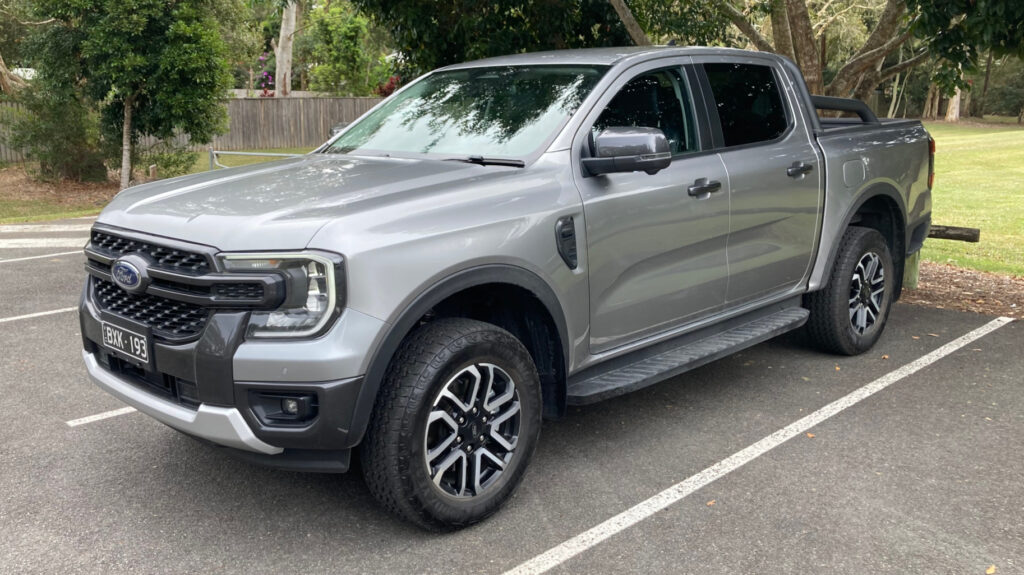
2023 Ford Ranger Double Cab Utes with a build date of July 2022 onwards score a 93% ANCAP score for child occupant protection. In the crash tests, it scored full points for both the frontal offset crash and the side impact test. For restraint installation, the Ford Ranger scored slightly higher with 12 out of 12, than the Ford Everest, which scored 11.66 out of 12. The Ranger and Everest both scored 10 out of 13 for on-board safety features. For now, this makes both vehicles the safest family cars for kids on sale in Australia.
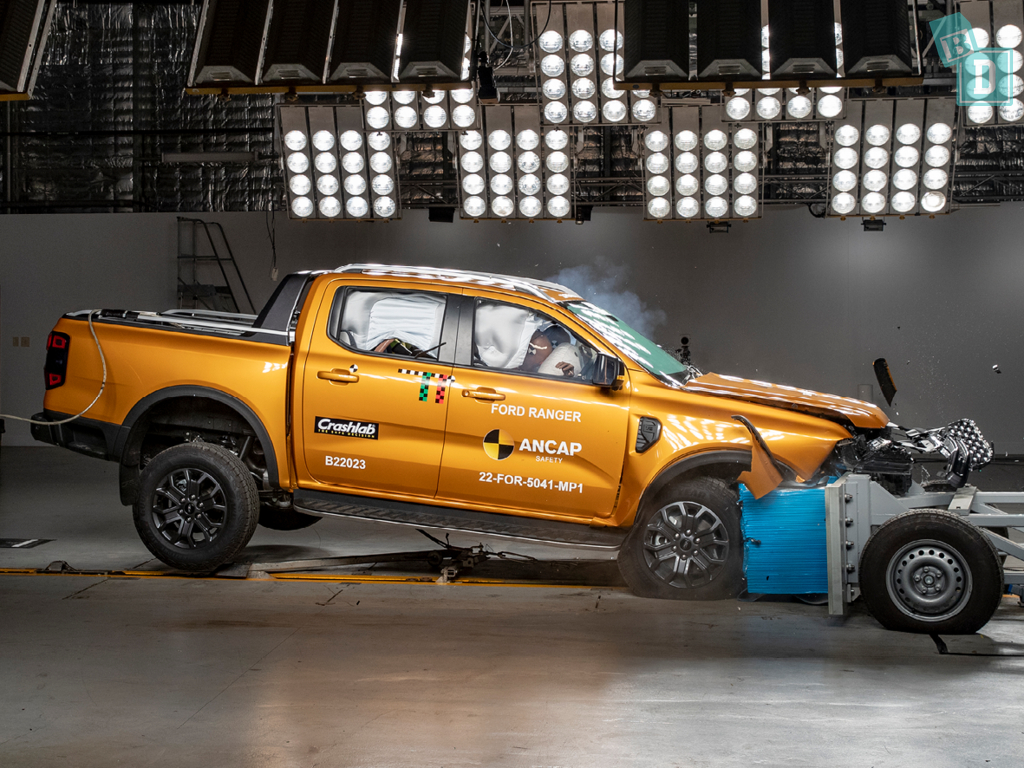
ANCAP wrote of the 2023 Ford Ranger testing:
In the frontal offset and side impact tests, protection of the 10 year and 6 year dummies was GOOD and the Ford Ranger scored maximum points in both of these tests.
The Ford Ranger is fitted with lower ISOFix anchorages and top tether anchorages on the rear outboard seats.
Installation of typical child restraints available in Australia and New Zealand showed that all of the selected child restraints could be accommodated in each of the rear outboard seating positions and full points were scored for this assessment.
NOTE: Installation of child restraints in the centre seating position of the second row in dual cab variants is not recommended as there is no top tether anchorage.
Installation of child restraints in the single and extended cab variants is not recommended as there are no top tether anchorages.
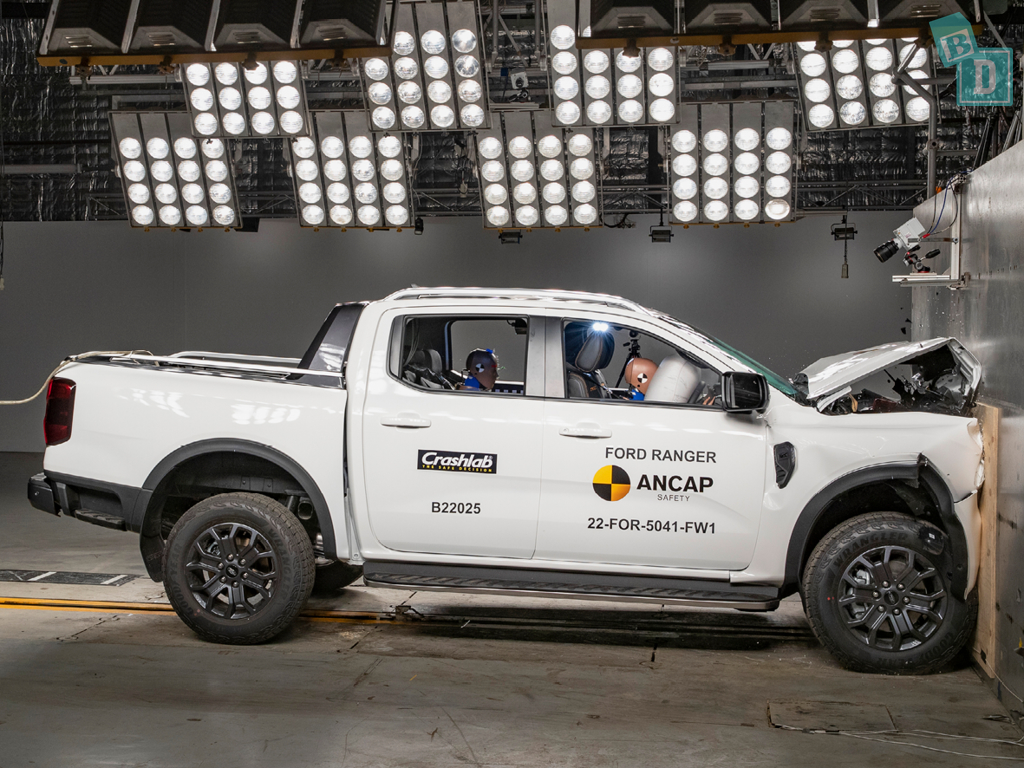
The 2023 Ford Ranger has nine airbags as standard:
Dual frontal, side chest-protecting and side head-protecting (curtain) airbags for both seating rows, and driver and passenger knee airbags are standard. A centre airbag which provides added protection to front seat occupants in side impact crashes is also standard.
There are also pretensioner seatbelts in the first and second-row outer seats (these are beneficial once your children are out of fully harnessed child seats).
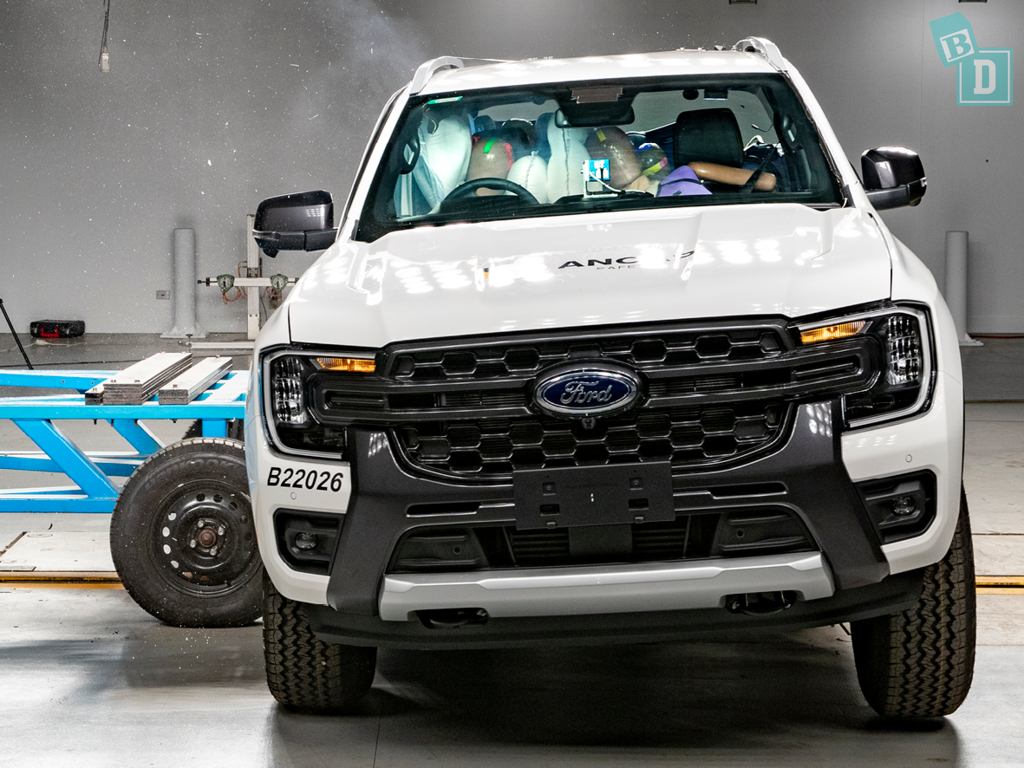
The ANCAP child restraint fitting charts below show which types of child seats were able to be safely installed in each row of seats of the 2023 Ford Ranger dual cab ute:
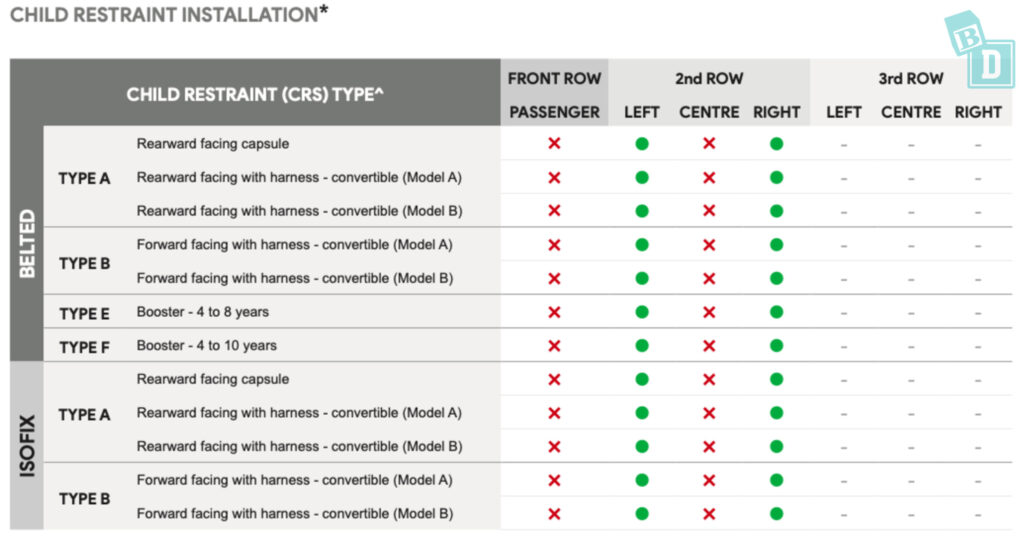
We also have to take the safety of the front passengers into account too when choosing our new family car, and the 2023 Ford Ranger Double Cab Ute scored 84%.
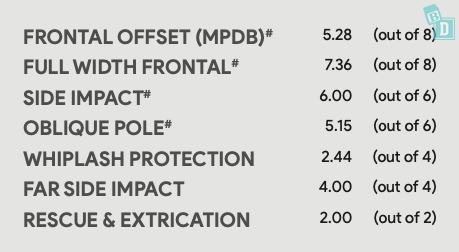
2- Volkswagen Amarok – Scores 93% for Child Occupant Protection & 86% for Adult Occupant Protection
The New Volkswagen Amarok is available as a dual cab ute for families and matches the Ranger for child occupant protection while being slightly higher rated for adult occupant protection by ANCAP. It can accommodate two child seats with ISOFix and has metal top tether anchors attached to the bodywork behind the second-row seats.
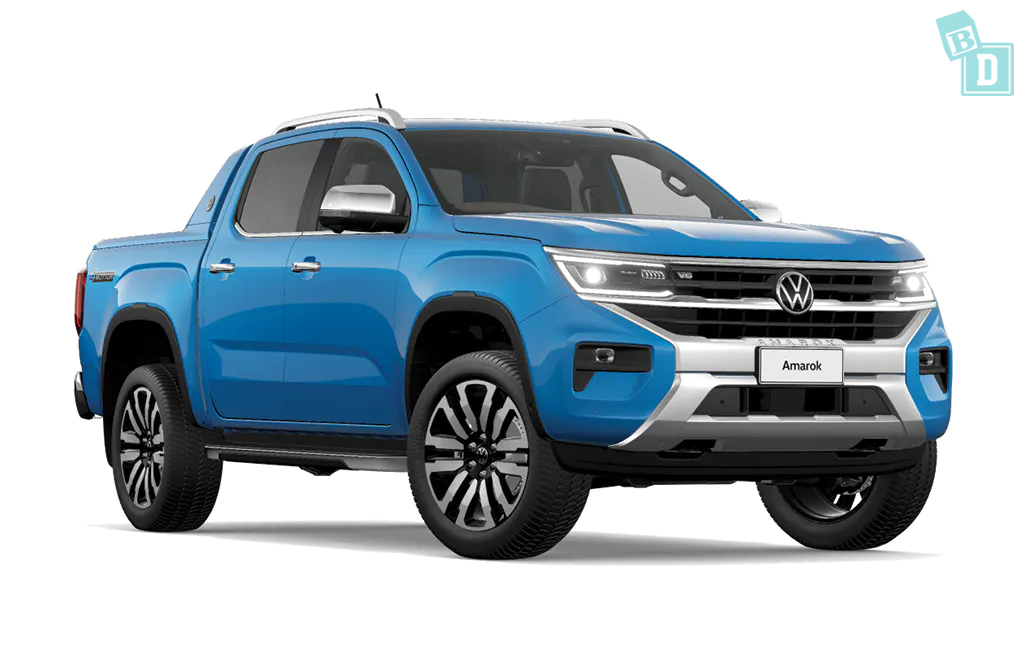
Volkswagen Amaroks with a build date of November 2022 onwards, scored 93% for child occupant protection, 46 out of 49 points. In the crash tests, it scored full points for both the dynamic front and dynamic side tests. The Volkswagen Amarok also got 12 out of 12 for child restraint installation and 10 out of 13 for on-board safety features. Making it a dual cab ute for your rear passengers.
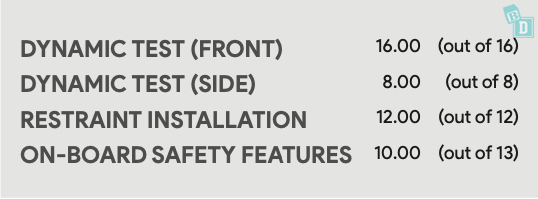
ANCAP wrote of the testing:
In the frontal offset and side impact tests, protection of the 10 year and 6 year dummies was GOOD and the Volkswagen Amarok scored maximum points in both of these tests.
The Volkswagen Amarok is fitted with lower ISOFix anchorages and top tether anchorages on the rear outboard seats.
Installation of typical child restraints available in Australia and New Zealand showed that all of the selected child restraints could be accommodated in each of the rear outboard seating positions and full points were scored for this assessment.
NOTE: Installation of child restraints in the centre seating position of the second row is not recommended as there is no top tether anchorage.
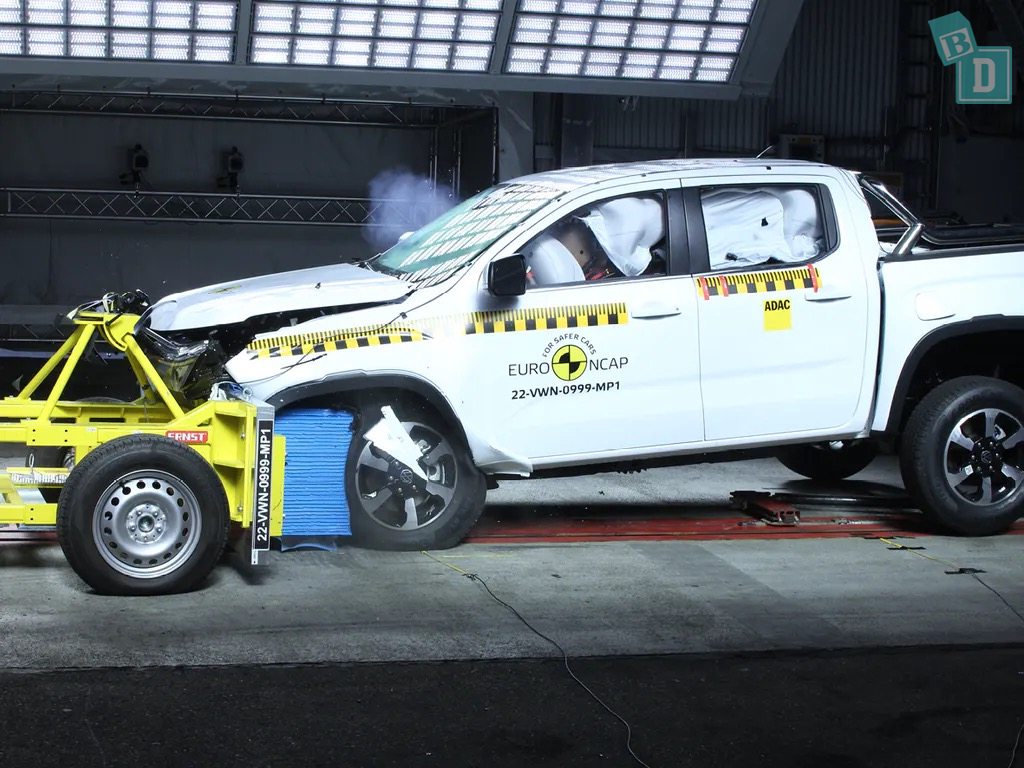
The Amarok has seven airbags as standard:
Dual frontal, side chest-protecting and side head-protecting (curtain) airbags, and driver and passenger knee airbags are standard. A centre airbag which provides added protection to front seat occupants in side impact crashes is also standard.
There are also pretensioner seatbelts in the first and second-row outer seats of the Volkswagen Amarok (these are beneficial once your children are out of fully harnessed child seats).
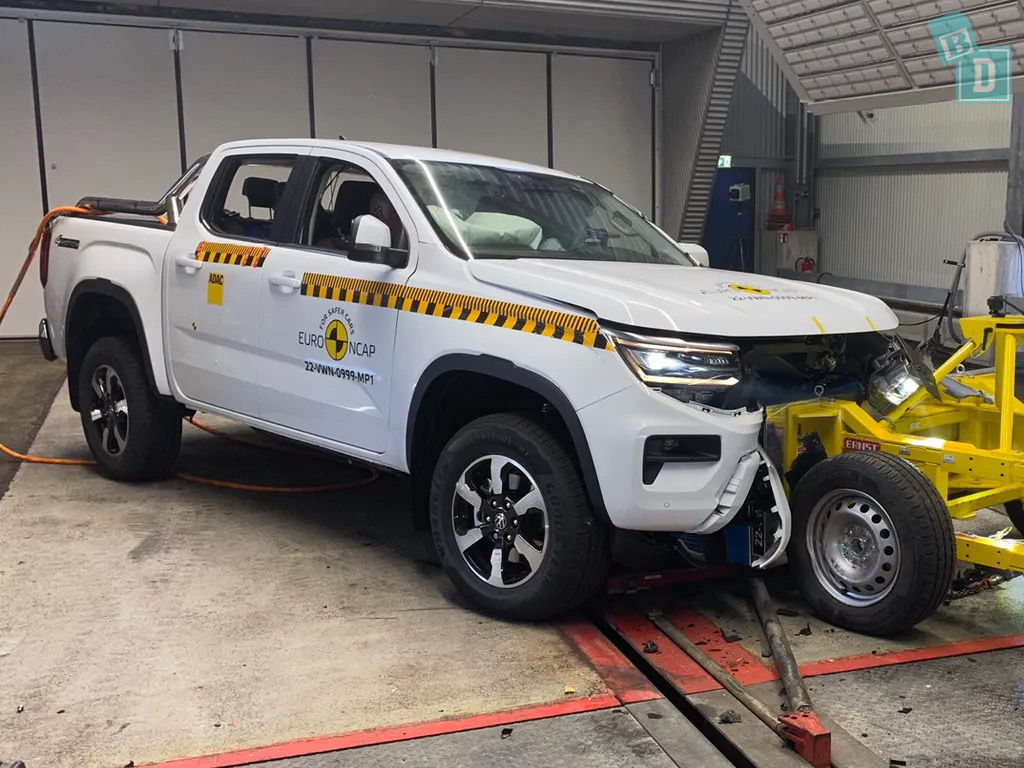
This ANCAP child restraint fitting chart shows which types of child seats were able to be safely installed in the second-row seats of the Volkswagen Amarok:
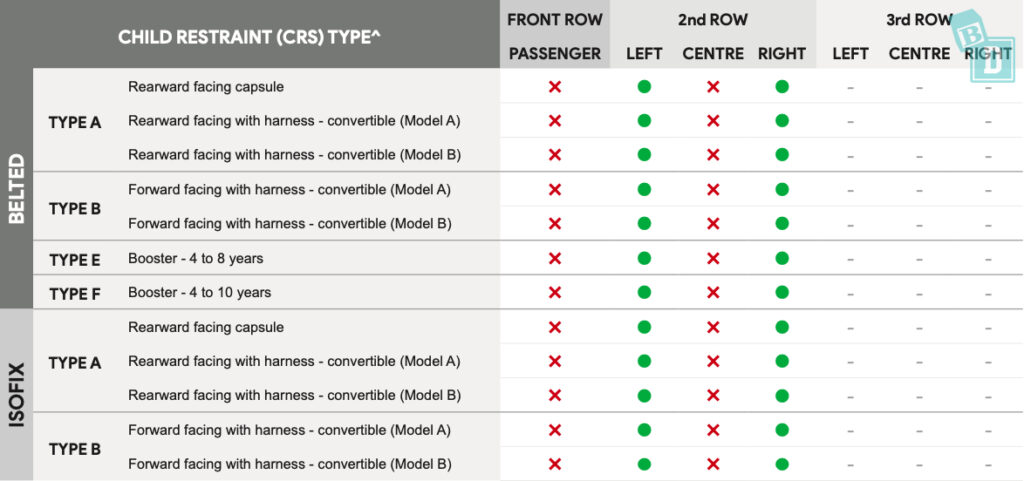
We also have to take the safety of the front passengers into account too when choosing our new family car, and the Volkswagen Amarok did reasonably well in this, with a score of 32.98 out of 38 or 86% for Adult Occupant Protection with 7.36 out of 8 for the full-width frontal crash test, 5.27 out of 8 for the frontal offset crash test, full marks for the side impact test and 5.15 out of 5 for the pole test. Scoring 3.19 out of 4 for whiplash protection, full marks for both far side impact and rescue and extraction.
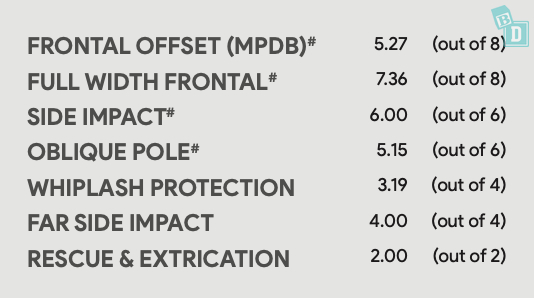
3- Isuzu D-Max – Scores 89% for Child Occupant Protection & 86% for Adult Occupant Protection
The Isuzu D-Max Dual Cab Ute matches the Amarok for adult occupant protection and dips just below a 90% score for child occupant protection. It can accommodate two child seats with ISOFix and has fabric loop style top tether strap guides behind the second-row headrests that you feed the tethers through to a central metal anchor.
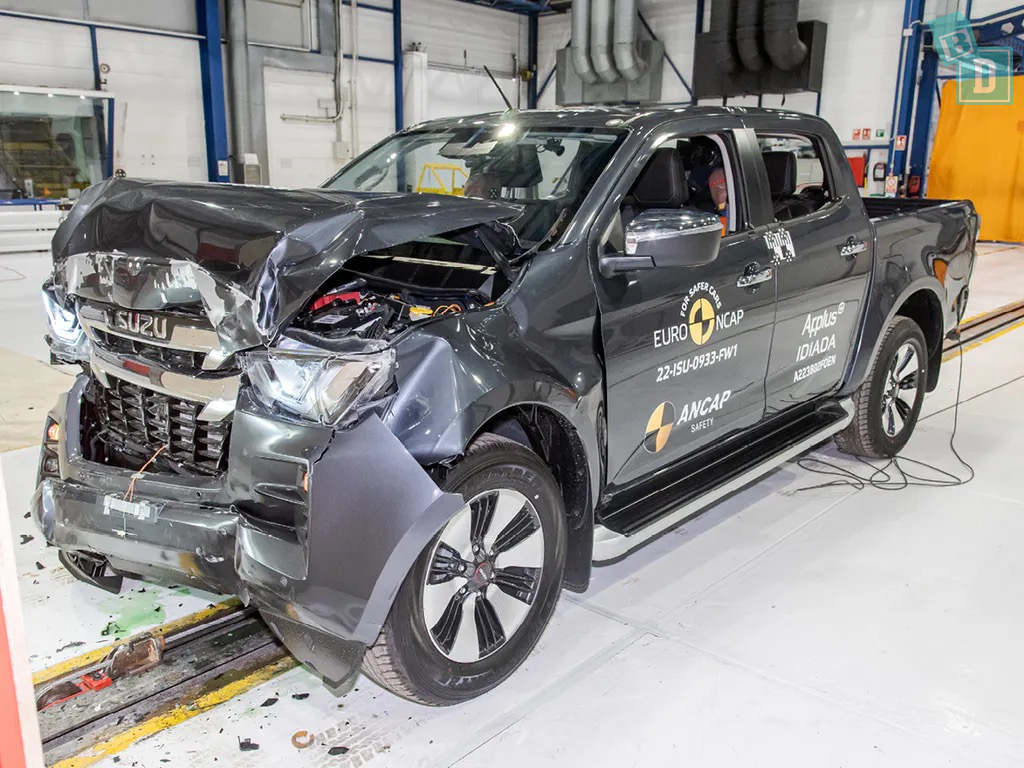
Isuzu D-Max Dual Cab Utes with a build date of July 2022 onwards, scored 89% for child occupant protection, 44 out of 49 points. In the crash tests, it scored full points for both the dynamic front and dynamic side tests. The Isuzu D-Max Dual Cab Ute also got 12 out of 12 for child restraint installation and 8 out of 13 for on-board safety features. Making it a good dual cab ute for your rear passengers.
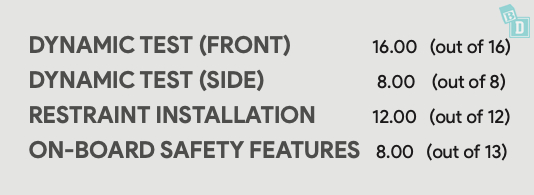
ANCAP wrote of the testing:
In both the frontal offset (MPDB) and side impact tests, protection was GOOD for all critical body areas for both the 6 year and 10 year child dummies.
The Isuzu D-MAX crew cab is fitted with lower ISOFix anchorages and top tether anchorages on the rear outboard seats. Installation of child restraints in the centre seat of the second row (crew cab variants) is not recommended as there is no top tether anchorage for this position.
Installation of typical child restraints available in Australia and New Zealand showed that all of the selected child restraints could be accommodated in each of the rear outboard seating positions in the crew cab and full points were scored for this assessment.
Installation of child restraints in the single and space cab variants is not recommended as there are no top tether anchorages.
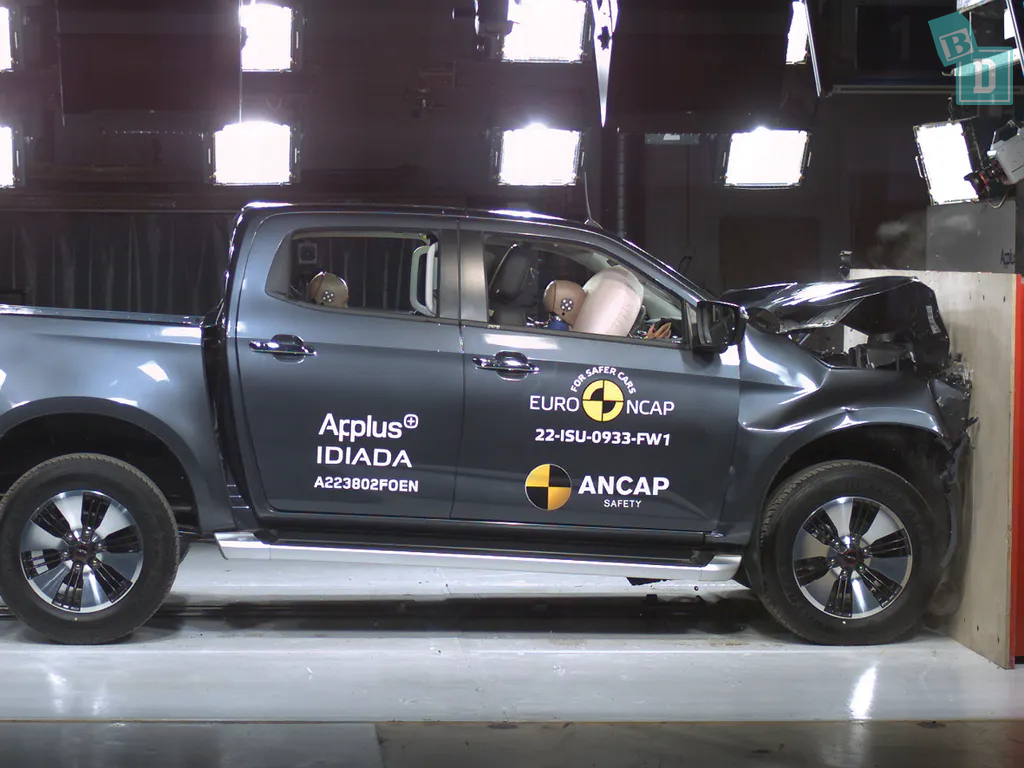
The Isuzu D-Max Dual Cab Ute has seven airbags as standard:
Dual frontal, side chest-protecting and side head-protecting (curtains) and a driver knee airbag are standard. A centre airbag which provides added protection to front seat occupants in side impact crashes is also standard on all variants.
There are also pretensioner seatbelts in the first and second-row outer seats of the Isuzu D-Max Dual Cab Ute (these are beneficial once your children are out of fully harnessed child seats).
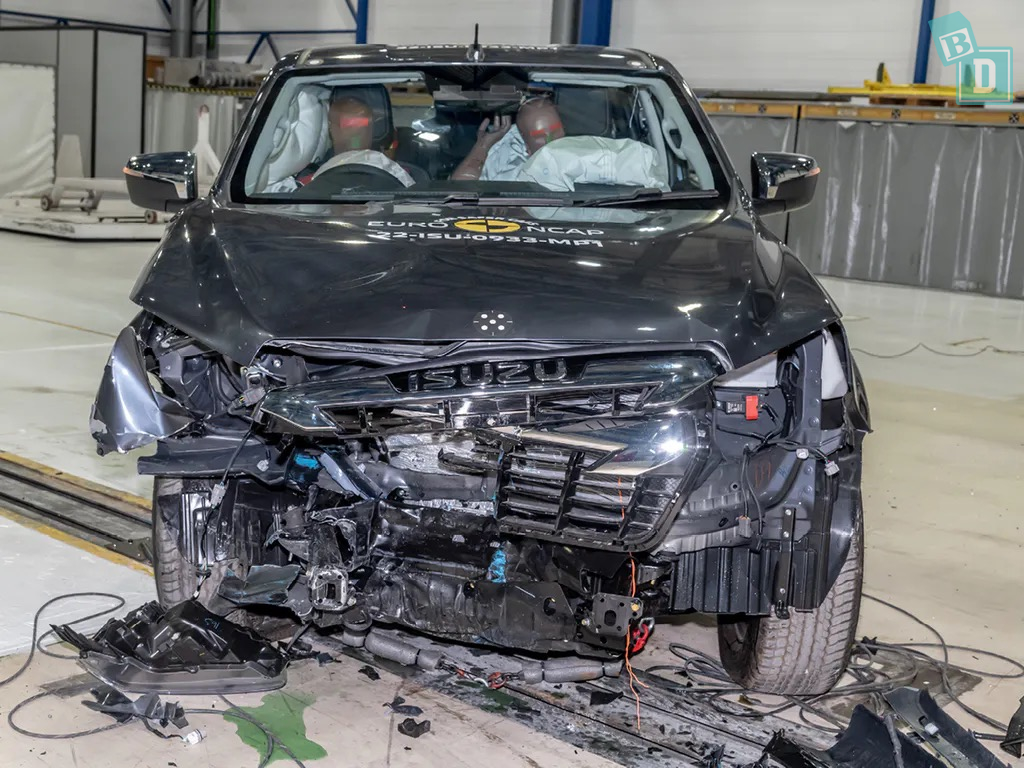
This ANCAP child restraint fitting chart shows which types of child seats were able to be safely installed in the second-row seats of the Isuzu D-Max Dual Cab Ute:
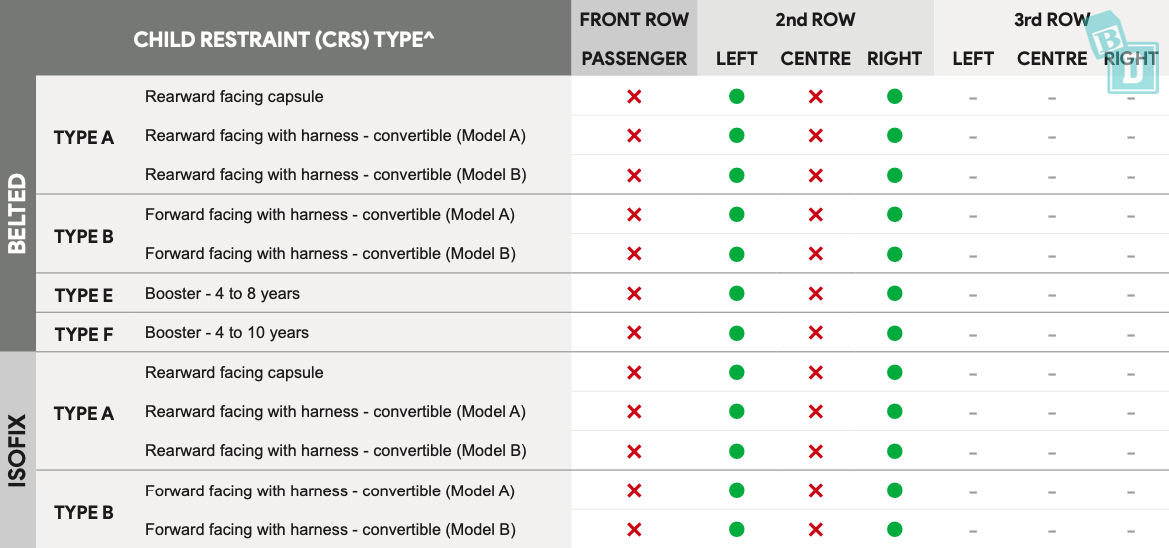
We also have to take the safety of the front passengers into account when choosing our new family ute, and the Isuzu D-Max Dual Cab Ute did reasonably well in this, with a score of 33 out of 38 or 86% for Adult Occupant Protection with 7.24 out of 8 for the full-width frontal crash test, 4.77 out of 8 for the frontal offset crash test, full marks for the side impact test and the pole test. Scoring 3.50 out of 4 for whiplash protection and the far side impact test and full marks for rescue and extraction.
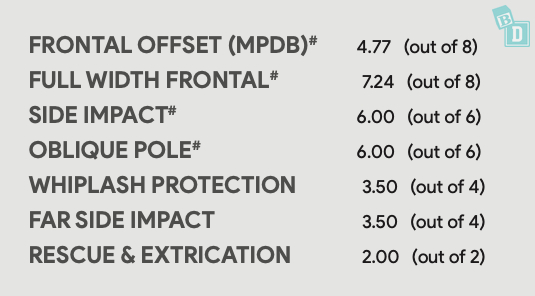
4- Mazda BT-50 – Scores 89% for Child Occupant Protection & 86% for Adult Occupant Protection
The Mazda BT-50 Dual Cab Ute Matches the D-Max for all ANCAP scoring as it is much the same vehicle with different styling. It can accommodate two child seats with ISOFix and has fabric loop style top tether strap guides behind the second-row headrests that you feed the tethers through to a central metal anchor.
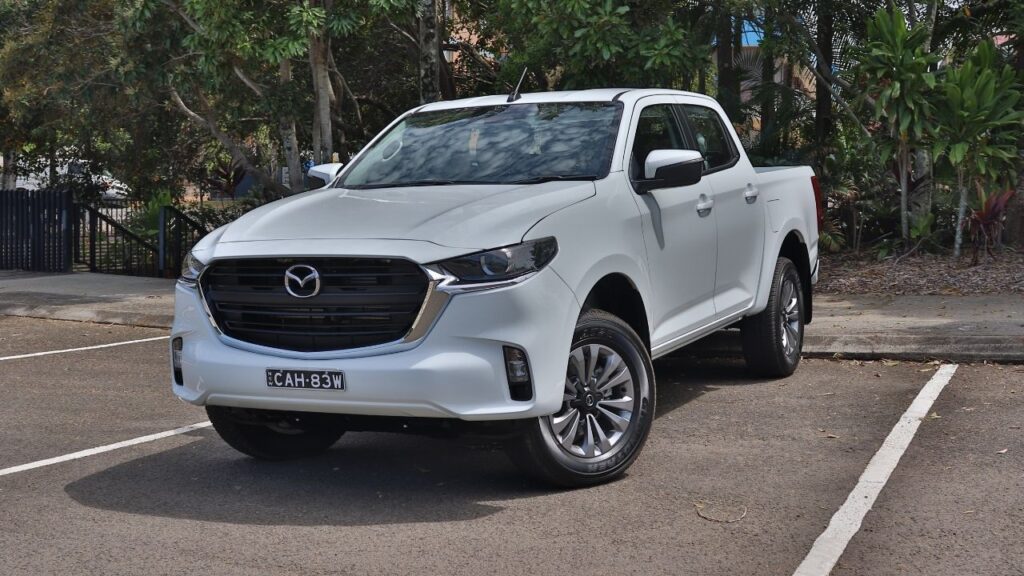
Mazda BT-50 Dual Cab Utes with a build date of July 2022 onwards score 89% for child occupant protection. This is what ANCAP says of their rating:
The ANCAP safety rating for the Mazda BT-50 is based on testing of its shared platform, the Isuzu D-MAX. ANCAP was provided with technical information which showed that the test results achieved by the D-MAX also apply to the BT-50.
Mazda BT-50 vehicles built from July 2022 are equipped with a revised driver knee airbag and instrument panel that provide improved safety performance. Additional frontal impact tests were conducted on the updated D-MAX to verify the safety improvement, and this 2022 rating combines the results of the additional 2022 tests with the results of the original D-MAX tests conducted in 2020.
This ANCAP safety rating applies to all BT-50 models built from July 2022, excluding the Thunder and XTR LE variants. The safety performance of the Thunder and XTR LE variants has not been assessed.
Mazda BT-50 Dual Cab Utes scored 89% for child occupant protection, 44 out of 49 points. In the crash tests, it scored full points for both the dynamic front and dynamic side tests. The Mazda BT-50 Dual Cab Ute also got 12 out of 12 for child restraint installation and 8 out of 13 for on-board safety features. Making it a good dual cab ute for your rear passengers.

ANCAP wrote of the testing:
In both the frontal offset (MPDB) and side impact tests, protection was GOOD for all critical body areas for both the 6 year and 10 year child dummies.
The Mazda BT-50 dual cab is fitted with lower ISOFix anchorages and top tether anchorages on the rear outboard seats. Installation of child restraints in the centre seat of the second row (dual cab variants) is not recommended as there is no top tether anchorage for this position.
Installation of typical child restraints available in Australia and New Zealand showed that all of the selected child restraints could be accommodated in each of the rear outboard seating positions in the dual cab and full points were scored for this assessment.
Installation of child restraints in the single and freestyle cab variants is not recommended as there are no top tether anchorages.

The Mazda BT-50 Dual Cab Ute has seven airbags as standard:
Dual frontal, side chest-protecting and side head-protecting (curtains) and a driver knee airbag are standard. A centre airbag which provides added protection to front seat occupants in side impact crashes is also standard on all variants.
There are also pretensioner seatbelts in the first and second-row outer seats of the Mazda BT-50 Dual Cab Ute (these are beneficial once your children are out of fully harnessed child seats).

This ANCAP child restraint fitting chart shows which types of child seats were able to be safely installed in the second-row seats of the Mazda BT-50 Dual Cab Utes :

We also have to take the safety of the front passengers into account when choosing our new family ute, and the Mazda BT-50 Dual Cab Utes did reasonably well in this, with a score of 33 out of 38 or 86% for Adult Occupant Protection with 7.24 out of 8 for the full-width frontal crash test, 4.77 out of 8 for the frontal offset crash test, full marks for the side impact test and the pole test. Scoring 3.50 out of 4 for whiplash protection and the far side impact test and full marks for rescue and extraction.

5- GWM Cannon Dual Cab Ute – Scores 87% for Child Occupant Protection & 86% for Adult Occupant Protection
The GWM Cannon Dual Cab Ute challenges the idea that Chinese-made vehicles are in some way weaker and less safe than mainstream brands. It can accommodate two child seats with ISOFix and has metal top tether anchors attached to the bodywork behind the second-row seats.
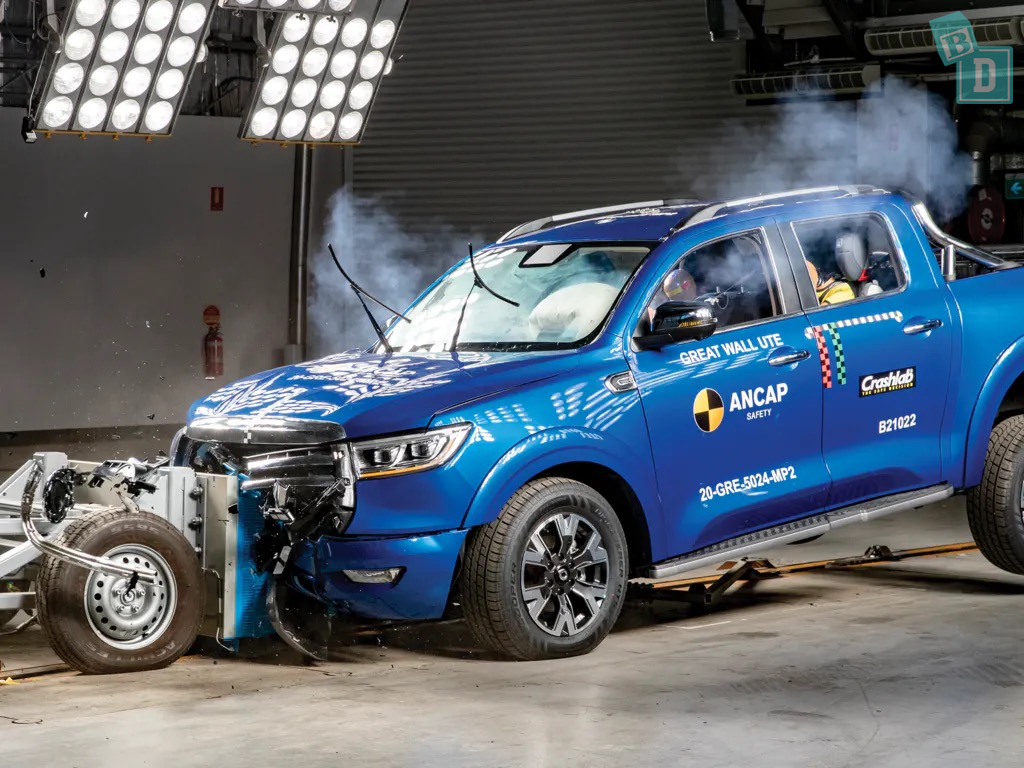
GWM Cannon Dual Cab Ute with a build date of July 2021 onwards, scored 87% for child occupant protection, 43.03 out of 49 points. In the crash tests, it scored full points for both the dynamic front and dynamic side tests. The GWM Cannon Dual Cab Ute also got 11.03 out of 12 for child restraint installation and 8 out of 13 for on-board safety features. Making it a fair dual cab ute for your rear passengers.
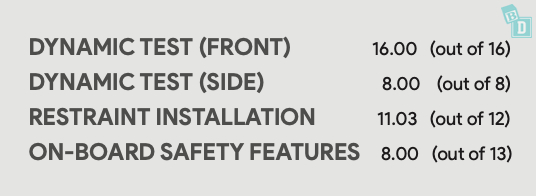
ANCAP wrote of the testing:
In both the frontal offset and side impact tests, protection was GOOD for all critical body areas for both the 6 year and 10 year child dummies.
The GWM Ute is fitted with lower ISOFix anchorages and top tether anchorages on the rear outboard seats. Installation of child restraints in the centre seat of the second row is not recommended as there is no top tether anchorage for this position.
Installation of typical child restraints available in Australia and New Zealand showed most child restraints could be accommodated in the outboard rear seating positions, however care is needed to correctly install one of the selected Type B convertible seats.
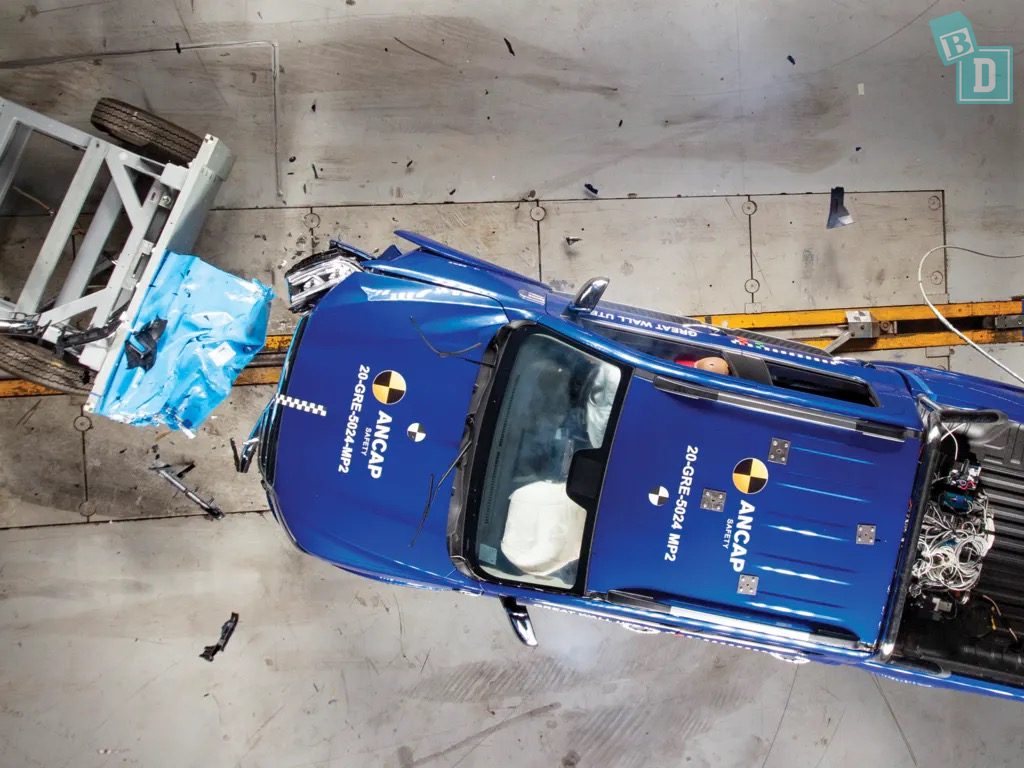
The GWM Cannon Dual Cab Ute has seven airbags as standard:
Dual frontal, side chest-protecting and side head-protecting (curtain) airbags are standard. A centre airbag which provides added protection to front seat occupants in side impact crashes is also standard on all variants.
There are also pretensioner seatbelts in the first and second-row outer seats of the GWM Cannon Dual Cab Ute (these are beneficial once your children are out of fully harnessed child seats).
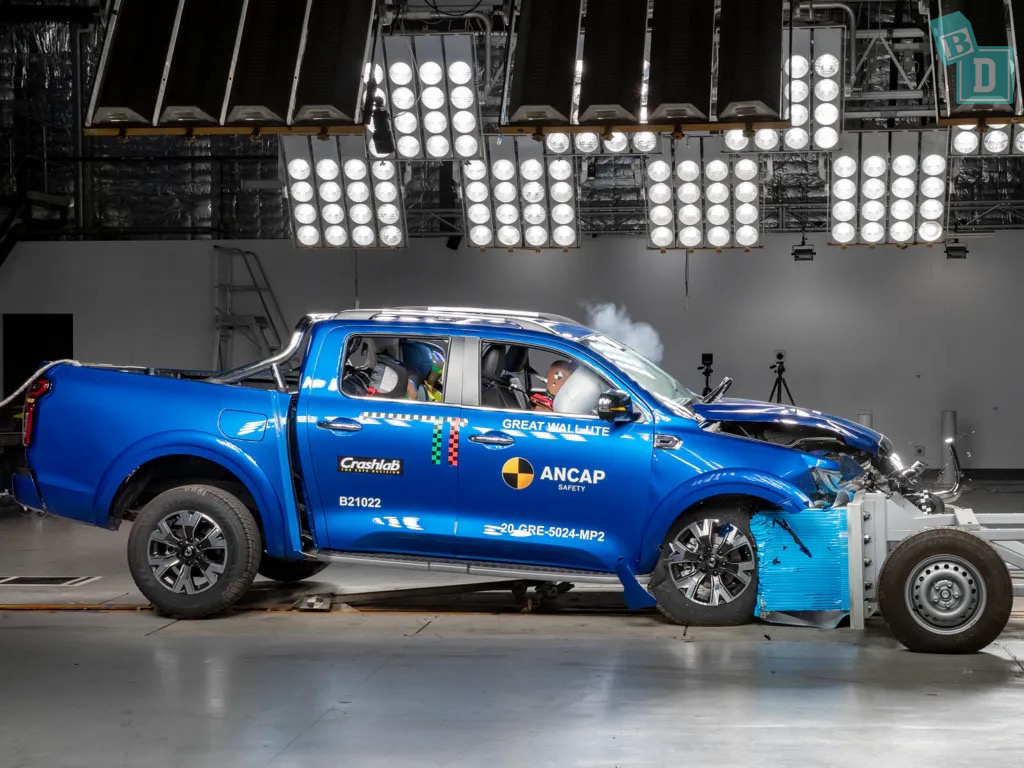
This ANCAP child restraint fitting chart shows which types of child seats were able to be safely installed in the second-row seats of the GWM Cannon Dual Cab Ute :
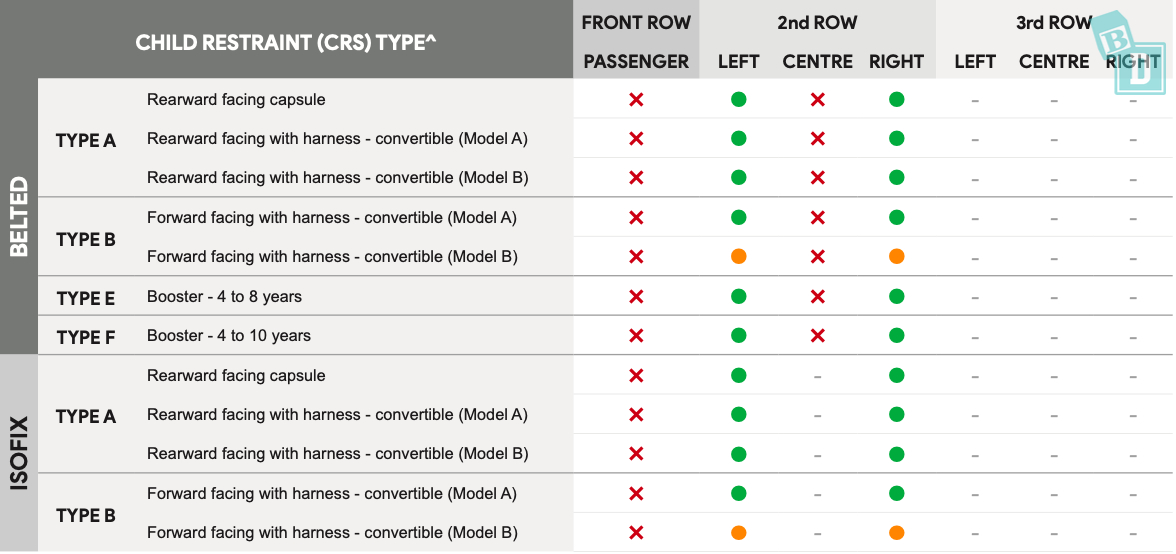
We also have to take the safety of the front passengers into account when choosing our new family ute, and the GWM Cannon Dual Cab Ute did reasonably well in this, with a score of 32.74 out of 38 or 86% for Adult Occupant Protection with 5.48 out of 8 for the full-width frontal crash test, 5.82 out of 8 for the frontal offset crash test, full marks for the side impact test and 5.56 out of 6 for the pole test. Scoring 3.88 out of 4 for whiplash protection and full marks for the far side impact test and for rescue and extraction.
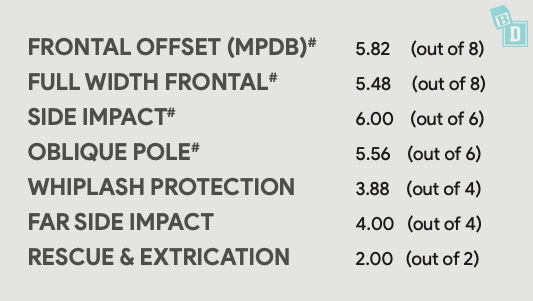
6- Toyota Hilux Dual Cab Ute – Scores 87% for Child Occupant Protection & 96% for Adult Occupant Protection
The Toyota Hilux Dual Cab Ute matches the GWM Cannon for child occupant protection but scored a lot higher than all other utes here for adult occupant protection. It can accommodate two child seats with ISOFix and has fabric loop style top tether strap guides behind the second-row headrests that you feed the tethers through to a central metal anchor. Its fabric loops give more space for the top tether straps to feed through than the D-Max and BT-50.
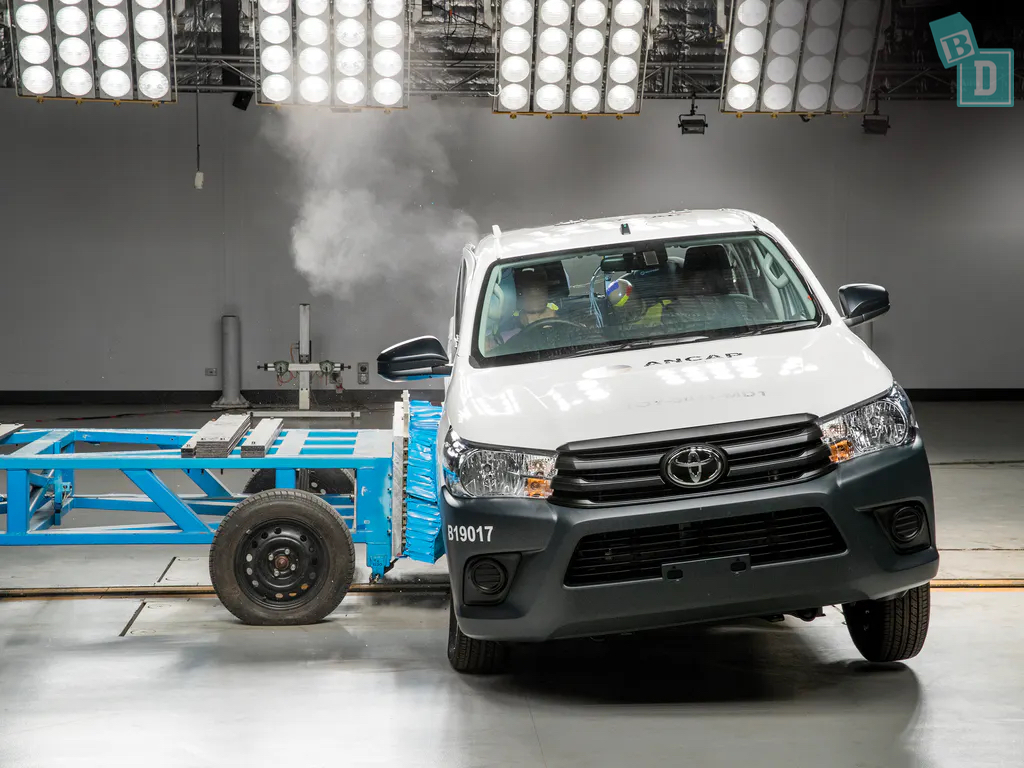
Toyota Hilux Dual Cab Ute with a build date of July 2019 onwards, scored 87% for child occupant protection, 42.6 out of 49 points. In the crash tests, it scored 12.64 out of 16 for the dynamic front and full points for the dynamic side test and for child restraint installation and 10 out of 13 for on-board safety features. Making it a fair dual cab ute for your rear passengers.

ANCAP wrote of the testing:
In the frontal offset test, protection of the head and neck of the 6 year dummy was MARGINAL, while the protection offered to all other critical body regions was GOOD for both the 6 year and 10 year dummies.
In the side impact test, protection was GOOD for both dummies and maximum points were scored.
The Toyota Hilux dual cab is fitted with lower ISOFix anchorages and top tether anchorages on the rear outboard seats. Installation of child restraints in the rear centre seating position of the dual cab is not recommended as there is no top tether anchorage. Installation of child restraints in the single and extra cab variants of the Hilux is not recommended as there are no top tether anchorages.
Installation of typical child restraints available in Australia and New Zealand showed that all of the selected child restraints could be accommodated in each of the rear outboard seating positions in the dual cab and full points were scored for this assessment.
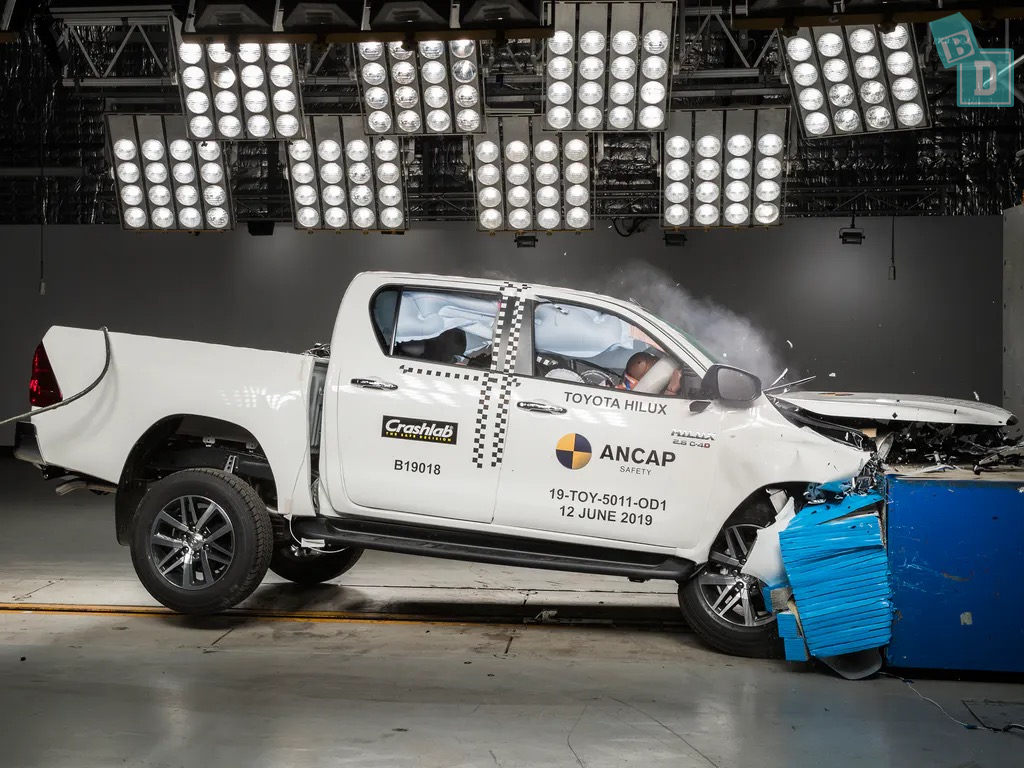
The Toyota Hilux Dual Cab Ute has seven airbags as standard:
Dual frontal, side chest-protecting and side head-protecting airbags (curtains) and a driver knee airbag are standard.
There are also pretensioner seatbelts in the first and second-row outer seats of the Toyota Hilux Dual Cab Ute (these are beneficial once your children are out of fully harnessed child seats).
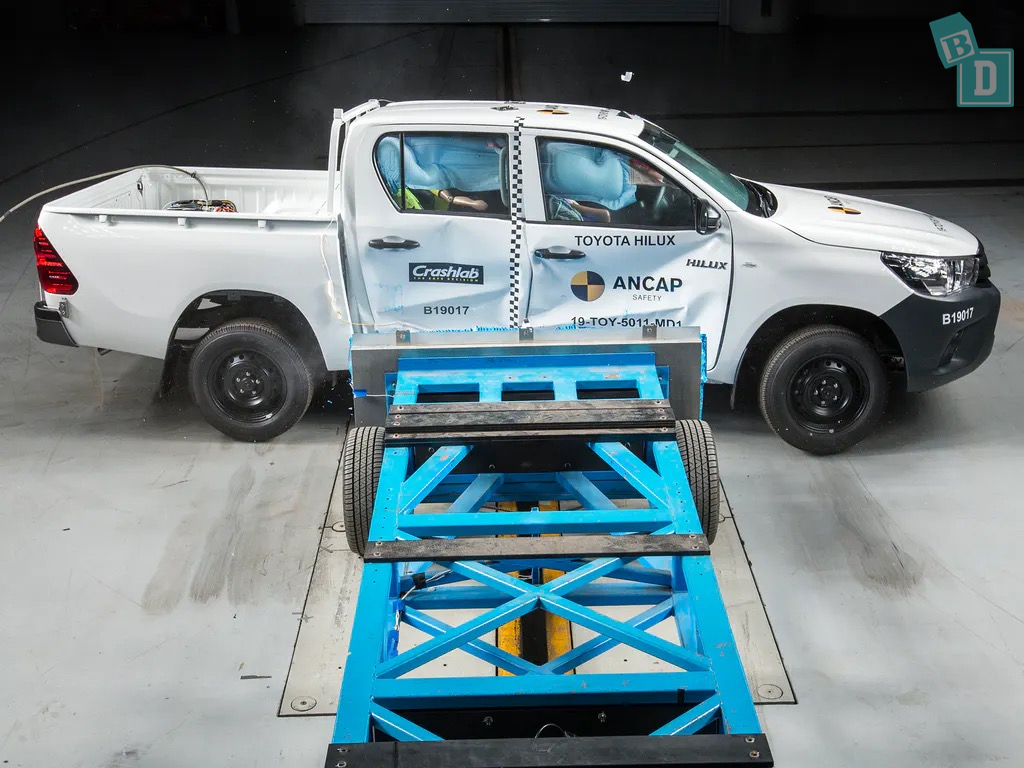
This ANCAP child restraint fitting chart shows which types of child seats were able to be safely installed in the second-row seats of the Toyota Hilux Dual Cab Ute:
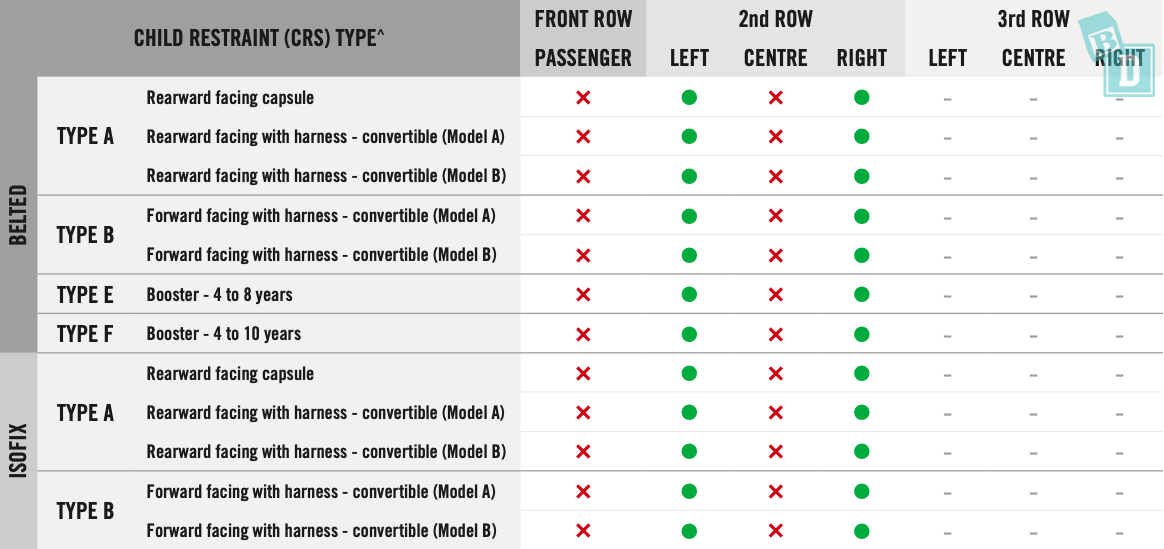
We also have to take the safety of the front passengers into account when choosing our new family ute, and the Toyota Hilux Dual Cab Ute did reasonably well in this, with a score of 36.7 out of 38 or 96% for Adult Occupant Protection with 7.50 out of 8 for the full-width frontal crash test, 7.36 out of 8 for the frontal offset crash test, full marks for the side impact test and for the pole test. Scoring 1.81 out of 4 for whiplash protection and full marks for AEB- City.
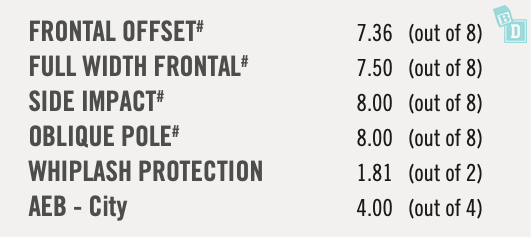

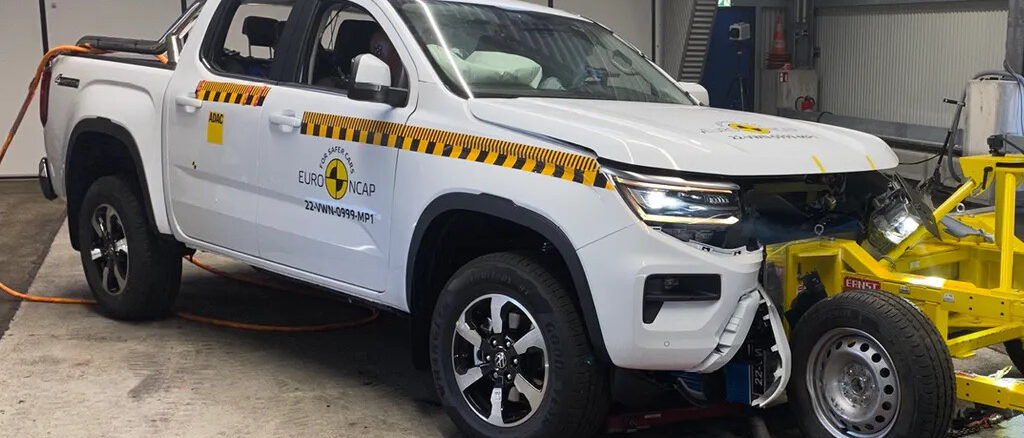
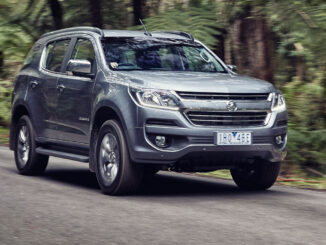
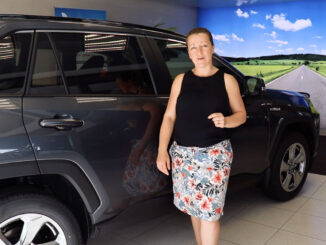
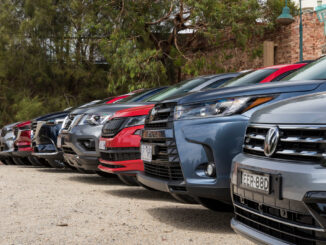
Be the first to comment